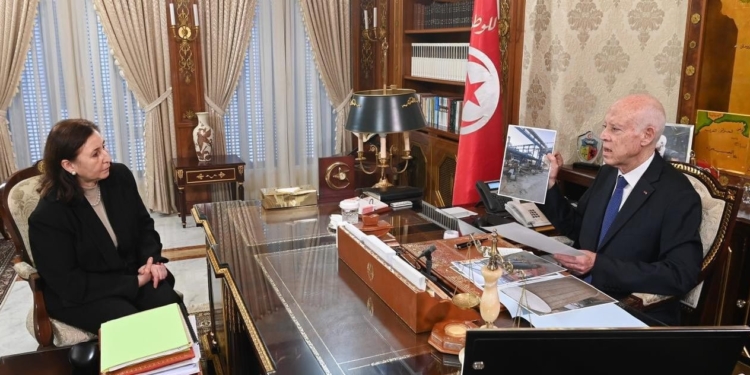In front of the head of government, the president makes the mobilization of the South a signal of national responsibility
The Carthage Palace served on Monday, October 21 as the setting for a meeting between President Kaïs Saïed and the head of government Sarra Zaafrani Zenzri. At the center of the discussions: the situation in Gabès. The Head of State paid tribute to the inhabitants who are mobilizing to “live in a healthy environment”, describing the current period as a “historic moment of sorting” for the country..
The day before, tens of thousands of citizens had marched in Gabès at the call of the UGTT and civil society to denounce industrial pollution and demand lasting solutions. According to several local estimates, between 40,000 and 45,000 people participated in this peaceful march, which paralyzed the region as part of a widely followed general strike.
For Kaïs Saïed, this mobilization reflects “a high sense of responsibility and patriotism”. He assured that he was monitoring the situation “day and night” and expressed his solidarity with the demonstrators.
Daghbaji, symbol of prolonged resistance
The president cited Mohamed Daghbaji, historic figure of the national resistance, evoking “the courage and loyalty” which, according to him, still characterize the population of Gabès today. Through this reference, he wanted to connect the contemporary environmental struggle to a tradition of collective resilience and attachment to sovereignty.
Kaïs Saïed recalled that in 2013, a plan had been developed locally to try to remedy pollution, supported by scientific work. He insisted on the need to apply these solutions: “The right to a healthy environment is a natural right of every citizen.”
The head of state also denounced any attempt to exploit the anger of residents for political purposes, while reaffirming the primacy of the law and the general interest. “Tunisia is neither for sale nor for rent,” he said, in a formula he likes to recall the inalienable nature of national sovereignty.
He finally praised the cooperation between citizens and security forces, calling it a “bulwark against any destabilization”. Quoting the poet Jarir, he concluded on a note of optimism:
“They claimed to kill the will of the people… but rejoice, O Tunisia, in the longevity of your resistance. »
Also read: Gabès angry: human tide against the pollution of the chemical complex








